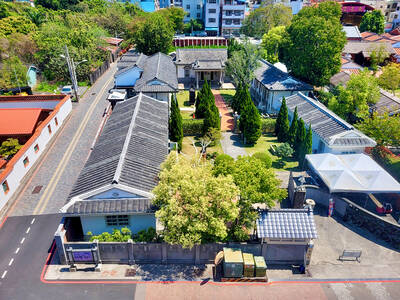The Taipei Film Festival is Taiwan's most democratic high-profile cinematic showcase. In some cases that's a good thing; in others it's not.
Unlike the older Golden Horse Film Festival (金馬影展), which only features high-profile works from around the world, the Taipei Film Festival (台北電影節) has become a platform for more diverse international and local productions. The emphasis is on encouraging young Taiwanese directors, and its national competition section, the Taipei Awards, welcomes works made in all types of formats. Prizes worth NT$1 million are handed out in each of four categories - narrative, documentary, experimental and animation - offering a comprehensive panorama of Taiwanese cinema.
This year's Taipei Awards once again sees a troupe of noted local productions, including box office success Island Etude (練習曲) by En Chen (陳懷恩), Berlinale winner Spider Lilies (刺青) and Tsai Ming-liang's (蔡明亮) I Don't Want to Sleep Alone (黑眼圈). Other films by both young and experienced filmmakers will make their world premieres here. And there will be an abundance of talent scouts and foreign festival curators looking for the new faces of Taiwanese cinema.

PHOTOS: COURTESY OF TAIPEI FILM FESTIVAL
One of the festival's opening films and a strong contender in both the Taipei Awards and the International New Talent Competition section is The Most Distant Course (最遙遠的距離). Director Lin Jing-jie's (林靖傑) feature debut tells the story of three Taipei residents escape to picturesque eastern Taiwan. Technically proficient, the film unfolds with a visually exuberant contrast between the cold, blue urban landscapes and the warm, golden-hued countryside as the protagonists travel great distances to find themselves.
Then there's The Wall Passer (穿牆人) by celebrated poet, theater director and filmmaker Hung Hung (鴻鴻). Possibly the most imaginative work Taiwan cinema has seen in the past year, it ingeniously blends science fiction with a romantic coming-of-age story about teenager who uses a magic stone to travel between two worlds. Taking a surrealistic approach to the material, the director's creativity doesn't stop with his film's glossy, stylish cinematography. This is a philosophical reflection that relates the increasing blurred boundaries between the real world and virtual reality with the ancient philosopher Zhuang Zi's (莊子) famous butterfly dream.
The documentary category also sees a diversity of issues and interests. A rare personal account of left-wing activists who suffered under the Chinese Nationalist Party's White Terror is documented in If I Have to Die 1,000 Times (如果我必須死一千次-台灣左翼紀事), while The Forgotten Corner (遺忘的國度-樂生療養院紀錄片) takes a sober look at the recent controversy over the Losheng (Happy Life) Sanatorium by recording the personal histories of its aging residents.

Film critic Mai Jo-yu (麥若愚) said TFF is a fair showcase for local productions that, for the most part, miss out on the Hong Kong- and China-dominated Golden Horse Awards (金馬獎). And TFF's Global Chinese Cinerama section gives Taiwan's filmmakers a chance to learn from the best Chinese filmmakers.
"I think the works of the sixth generation of directors in China in this year's Chinese cinema section serve as great examples for Taiwan's young filmmakers, in that they eloquently demonstrate how art-house cinema can also tell a good story that can be enjoyed by members of the general public," Mai said.
The festival's platform for Taiwanese cinema has quickly gained international visibility, this year attracting curators and film professionals from South Korea, Japan and Singapore to the Netherlands and Canada.
But as its reputation increases, TFF faces a bureaucratic quandary. As an event organized under the auspices of the Taipei City Government, the festival is subject to regulations that prevent it from having a permanent executive body.
The rules were designed to prevent abuses of power, but they are damaging the vitality of the film festival since, unlike other government-funded film festivals throughout the world, TFF's organizers have to put things together in a shorter period of time and cannot plan for the future.
This year's festival director Jane Yu (游惠貞) said the problem started when the law was promulgated in 2000. An improvement was made after then-Taipei City Bureau of Cultural Affairs head Lung Ying-tai (龍應台) consulted with curators and professionals and found a way to allow teams to work for two consecutive years. But lingering uncertainty and budget cuts caused the previous organizer to withdraw last year.
"Sustainability is the most important element in a cultural undertaking. With the managerial uncertainty, long-term planning is out of the question, let alone the accumulation of learning, experience, contacts and training [that is] essential to cultural events like film festivals," Yu said.
A more viable solution is to establish a permanent executive body and a term system that would allow a festival director to hold the position for a longer period of time.
Despite these problems, TFF's current director maintains a can-do spirit. "There are far too many defects is the system, but we have to keep working and try to solve problems along the way," Yu said.

In the March 9 edition of the Taipei Times a piece by Ninon Godefroy ran with the headine “The quiet, gentle rhythm of Taiwan.” It started with the line “Taiwan is a small, humble place. There is no Eiffel Tower, no pyramids — no singular attraction that draws the world’s attention.” I laughed out loud at that. This was out of no disrespect for the author or the piece, which made some interesting analogies and good points about how both Din Tai Fung’s and Taiwan Semiconductor Manufacturing Co’s (TSMC, 台積電) meticulous attention to detail and quality are not quite up to

Chinese Nationalist Party (KMT) Chairman Eric Chu (朱立倫) hatched a bold plan to charge forward and seize the initiative when he held a protest in front of the Taipei City Prosecutors’ Office. Though risky, because illegal, its success would help tackle at least six problems facing both himself and the KMT. What he did not see coming was Taipei Mayor Chiang Wan-an (將萬安) tripping him up out of the gate. In spite of Chu being the most consequential and successful KMT chairman since the early 2010s — arguably saving the party from financial ruin and restoring its electoral viability —

It is one of the more remarkable facts of Taiwan history that it was never occupied or claimed by any of the numerous kingdoms of southern China — Han or otherwise — that lay just across the water from it. None of their brilliant ministers ever discovered that Taiwan was a “core interest” of the state whose annexation was “inevitable.” As Paul Kua notes in an excellent monograph laying out how the Portuguese gave Taiwan the name “Formosa,” the first Europeans to express an interest in occupying Taiwan were the Spanish. Tonio Andrade in his seminal work, How Taiwan Became Chinese,

Toward the outside edge of Taichung City, in Wufeng District (霧峰去), sits a sprawling collection of single-story buildings with tiled roofs belonging to the Wufeng Lin (霧峰林家) family, who rose to prominence through success in military, commercial, and artistic endeavors in the 19th century. Most of these buildings have brick walls and tiled roofs in the traditional reddish-brown color, but in the middle is one incongruous property with bright white walls and a black tiled roof: Yipu Garden (頤圃). Purists may scoff at the Japanese-style exterior and its radical departure from the Fujianese architectural style of the surrounding buildings. However, the property